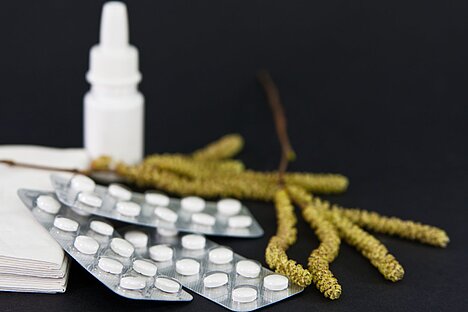Histamine

Histamine is a substance that has many important functions in your dog's body. However, too much histamine can also cause problems. In this article you will find out what histamine is, how it is produced and broken down, what the advantages and disadvantages are and how you can help your dog with a histamine intolerance.
What is histamine?
Histamine is a tissue hormone and messenger substance that occurs naturally in the body. It is produced, for example, in the mast cells of the skin and in the cells of the gastric mucosa. In the body, it is an important neurotransmitter that influences, among other things, the release of stomach acid, body temperature, blood pressure and sleep-wake behavior.
How is histamine formed and broken down?
Histamine is produced by the conversion of histidine, an amino acid found in many foods. In healthy dogs, histamine is broken down in the intestine with the help of the enzyme diamine oxidase (DAO). Like serotonin and tyramine, histamine belongs to the group of biogenic amines.
What are the benefits of histamine?
Histamine has many positive effects on your dog's body. For example, it helps in the defense against pathogens by increasing blood circulation and triggering inflammatory reactions. It also aids digestion by stimulating the production of stomach acid. It also plays a role in the dog's learning ability and memory.
What are the disadvantages of histamine?
Too much histamine can also have negative consequences. If the DAO enzyme is not sufficiently present or is blocked, or if too much histamine-containing food is fed, histamine can accumulate in the body. This leads to hypersensitivity to histamine, or histamine intolerance.
The symptoms of histamine intolerance can be very diverse. For example, it can lead to skin problems such as itching, redness or eczema. Gastrointestinal complaints such as diarrhea, vomiting or flatulence can also occur. Other possible signs include respiratory problems such as coughing or sneezing as well as behavioral changes such as restlessness or aggression.
How can you help your dog if he has a histamine intolerance?
If you suspect that your dog is suffering from histamine intolerance, you should first consult a vet. They can make an accurate diagnosis and prescribe medication if necessary. Antihistamines are active ingredients that can block the effect of histamine. They are often used in combination with other medications to treat allergy symptoms. However, they have side effects such as tiredness or loss of appetite and do not stop the itching immediately.
Another important measure is to adjust your dog's diet. You should try to find out which foods trigger a histamine-rich reaction in your dog and then avoid them. Typical histamine-rich foods are, for example, fish products (especially fish meal), offal (especially liver), yeast or cheese. Certain additives such as preservatives or colorants can also release histamine. Instead, you should offer your dog fresh, high-quality food that contains little histamine. This includes, for example, lean meat (especially poultry), eggs, rice or potatoes.
Another option is to support your dog's DAO production. DAO is formed in the mucous membrane of the small intestine and requires vitamin B6 and copper as co-factors. You can provide your dog with these nutrients in the form of supplements or natural sources such as bananas, nuts or linseed. Probiotics can also help to improve the intestinal flora and increase DAO activity.
Histamine is an important substance in your dog's body and has many positive functions. However, too much histamine can lead to histamine intolerance, which can manifest itself in various symptoms. If you suspect or have identified a histamine intolerance in your dog, you should speak to your vet and adjust your dog's diet. You can also try to support your dog's DAO production by administering antihistamines if necessary. This can improve your dog's well-being and quality of life.
The authors assume that a veterinarian should be consulted if an animal is ill and that medication should only be taken after consultation with a doctor or pharmacist. Only an individual examination can lead to a diagnosis and treatment decision.
We help you find the nearest vet → This way